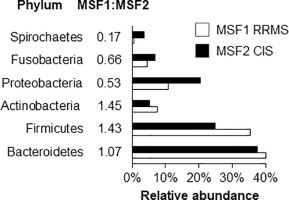当前位置:
X-MOL 学术
›
J. Neuroimmunol.
›
论文详情
Our official English website, www.x-mol.net, welcomes your feedback! (Note: you will need to create a separate account there.)
Deep DNA metagenomic sequencing reveals oral microbiome divergence between monozygotic twins discordant for multiple sclerosis severity
Journal of Neuroimmunology ( IF 3.3 ) Pub Date : 2020-06-01 , DOI: 10.1016/j.jneuroim.2020.577237 Anne I Boullerne 1 , Guy R Adami 2 , Joel L Schwartz 2 , Demetrios Skias 3 , Mark Maienschein-Cline 4 , Stefan J Green 4 , Douglas L Feinstein 5
Journal of Neuroimmunology ( IF 3.3 ) Pub Date : 2020-06-01 , DOI: 10.1016/j.jneuroim.2020.577237 Anne I Boullerne 1 , Guy R Adami 2 , Joel L Schwartz 2 , Demetrios Skias 3 , Mark Maienschein-Cline 4 , Stefan J Green 4 , Douglas L Feinstein 5
Affiliation

|
In contrast to gut, the oral microbiome of MS patients has not been characterized. Deep sequencing of saliva DNA from a pair of monozygotic twins (MSF1 with relapsing remitting MS; MSF2 with clinically isolated syndrome) identified 2036 bacterial species. Relative abundances of 3 phyla were higher, and 3 lower in MSF1 versus MSF2. Species diversity was greater in MSF2, and 20 abundant species differed at least 2-fold. Pathway analysis identified 116 functional hierarchies differing 50% or more. Although limited to one pair of twins, our data suggests that oral microbiome analysis may be useful for diagnosis or monitoring therapeutic efficacy.
中文翻译:

深度 DNA 宏基因组测序揭示了多发性硬化严重程度不一致的单卵双胞胎之间的口腔微生物组差异
与肠道相反,MS 患者的口腔微生物组尚未得到表征。对一对同卵双胞胎(MSF1 具有复发缓解型 MS;MSF2 具有临床孤立综合征)的唾液 DNA 进行深度测序,确定了 2036 种细菌。与 MSF2 相比,MSF1 中 3 个门的相对丰度较高,而 3 个较低。MSF2 中的物种多样性更大,20 个丰富的物种至少相差 2 倍。通路分析确定了 116 个功能层次,差异 50% 或更多。尽管仅限于一对双胞胎,但我们的数据表明,口腔微生物组分析可能有助于诊断或监测治疗效果。
更新日期:2020-06-01
中文翻译:

深度 DNA 宏基因组测序揭示了多发性硬化严重程度不一致的单卵双胞胎之间的口腔微生物组差异
与肠道相反,MS 患者的口腔微生物组尚未得到表征。对一对同卵双胞胎(MSF1 具有复发缓解型 MS;MSF2 具有临床孤立综合征)的唾液 DNA 进行深度测序,确定了 2036 种细菌。与 MSF2 相比,MSF1 中 3 个门的相对丰度较高,而 3 个较低。MSF2 中的物种多样性更大,20 个丰富的物种至少相差 2 倍。通路分析确定了 116 个功能层次,差异 50% 或更多。尽管仅限于一对双胞胎,但我们的数据表明,口腔微生物组分析可能有助于诊断或监测治疗效果。



























 京公网安备 11010802027423号
京公网安备 11010802027423号